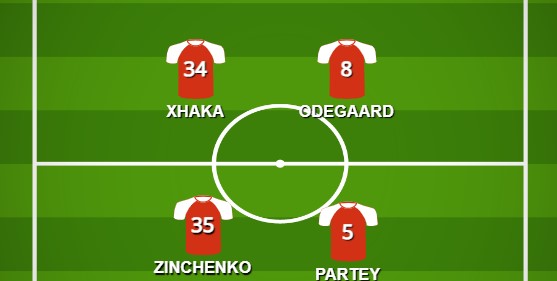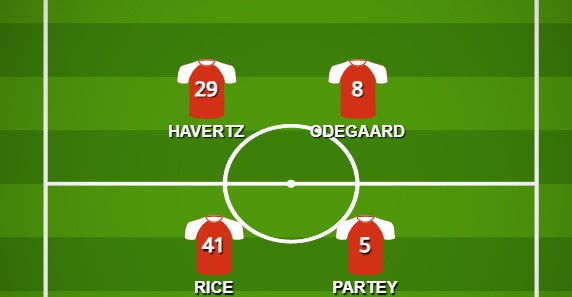Formation graphics dominate a lot of thinking about how we view our teams, tactically. I think most Arsenal fans would view the team as playing in a 433 and that isn’t incorrect. I think a large number of supporters also appreciate that formations are fluid and look different in and out of possession. Sometimes your thinking changes a lot when you ‘flip the graphic’ as it were.
Personally, I don’t really view Arsenal as playing in a 433. I think the key to the evolutions of Arteta’s team become clearer when you start thinking about the setup as a box midfield, with two deeper lying players and two more offensive players ahead of them in parallel. While it is true that Arsenal play with three principal midfielders, they always have a player who leaves their ‘formation graphic’ post to form a quartet.
Arsenal essentially have dual 6s and dual advanced 8s and it can fan out into more of a diamond shape in possession. Last season, that was achieved by Zinchenko moving into a left six position with either Partey or Jorginho off to the right of him. Ahead of them they had Xhaka as a left eight and Odegaard as a right eight. That meant that the midfield box looked like this.

It is fair to say supporter patience has been tested with Zinchenko this season. Supporters rarely feel comfortable seeing a member of the defence moving into midfield anyway, much in the same way we will never quite come to terms with a goalkeeper who ‘baits the press.’ It makes us stressed and we are not elite athletes like the players are, we are wired to resist that level of risk.
However, it would be dishonest of me to hand wave the fact that the risk reward dial in Zinchenko’s performances had drifted too close to the ‘risk’ side. The damaging home defeat to Aston Villa was his final start of the season and while I think a lot of this is due to some tactical redundancy, which I will cover in a minute, even as something of a Zinchenko apologist, his edge of the box giveaway that led to Villa hitting the crossbar had me cursing his name with the best of them.
I think a large part of Zinchenko’s tactical redundancy started with the signing of Declan Rice. Rice had been used interchangeably at West Ham as a deep lying midfielder and as a more box-to-box presence but he has always veered to the left of their double pivot. At West Ham, Soucek bore right and Rice bore left, that is the space Rice likes and that has been Zinchenko’s slot at Arsenal.
But it has been the adoption of Kai Havertz at centre-forward that has really changed the way Arsenal comprise their midfield box. As I wrote a few weeks ago, instead of Zincheko inverting from left-back, Havertz now drops back from centre-forward to create the box shape, leaving Rice and either Partey or Jorginho in the double pivot. In recent weeks, that means it has looked more like this.

The question for Declan Rice during this spell has not necessarily been whether he is a six or an eight, it is that he is both, depending on the phase of play. Off the ball, he can sit in next to Partey and create a muscular barrier ahead of the back four. When Arsenal attack and Havertz is needed in more advanced areas, Rice has both the license and the engine to burst forward and fill the ‘left eight’ role. Neither Partey nor Jorginho has the athleticism or the need to leave their armchair in deep midfield.

In a title run-in, it is typical for teams to settle on an eleven or a system and prize continuity for the ‘play-off’ section of the campaign. Those rules don’t necessarily apply for an entire season, however. Arsenal can’t and won’t play those players in those roles for an entire season, they will need flexibility and an array of different options.
That could mean Havertz back into midfield while a shiny new striker scores 78 goals next season to fire Arsenal to the treble. In that scenario, Arsenal might need to invert a full-back again to create that box shape (and it doesn’t have to be Zinchenko, it could be Jurrien Timber or Ben White). While I accept that many Arsenal fans reading this wouldn’t consider Zinchenko ‘an uncomfortable sale’, his potential availability does expose the paradox of selling players.
Essentially, in order to sell well, players need to have value and if they have value, it means they might still have value to you. I don’t think Manchester City were desperate to sell Cole Palmer but an offer came in and they took it. I don’t think Arsenal were desperate to sell Alex Iwobi in the summer of 2019 until a good offer came in. There has to be some jeopardy to extract value.
I fear many fans will find this out to their cost when Aaron Ramsdale is sold this summer. I strongly suspect the fee Arsenal extract will be smaller than people will have imagined and that fee won’t reflect his ability, it will reflect his value and those two concepts are not always aligned. Ramsdale sat on the bench for a year and buying clubs know that Arsenal don’t want him. That impacts the price, that is how markets work in pretty much every industry. Unwanted goods sell at knockdown prices.
This will be especially true in an era of increased spending regulations in the Premier League, which will impact the prices clubs are able to pay. In my view, this is no bad thing, injecting some reality back into the market is much needed, it just might mean an adjustment period where you sell players for less than you paid.
Zinchenko is 27 years old. I don’t believe he is entirely redundant because I think Arsenal will need an inverted full-back again and he is one of the best at that role. But Timber and White can do it, Tomiyasu can do it to a reasonable level. Arteta even experimented with Partey doing it from right-back last August and that was a sign that the writing was on the wall for the Ukrainian, that the left side was going to become Declan Rice’s terrain and, put simply, Rice is far more important to Arsenal than Zinchenko.


